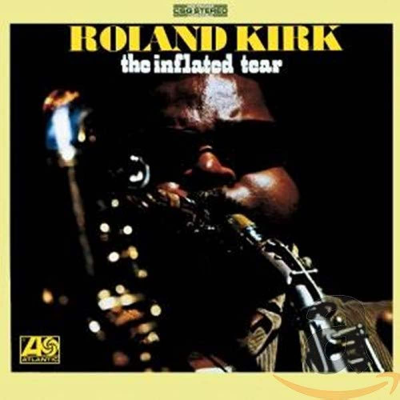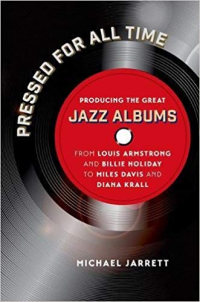.
.
.
.
…..Drawn from interviews with prominent producers, engineers, and record label executives, Michael Jarrett’s Pressed For All Time: Producing the Great Jazz Albums is filled with interesting stories behind some of jazz music’s most historic, influential, and popular recordings. In cooperation with Jarrett and University of North Carolina Press, Jerry Jazz Musician occasionally publishes a noteworthy excerpt from the book, which is now available in trade paperback.
.
.
In this edition, producer Joel Dorn talks with Michael Jarrett about his relationship with the legendary multi-instrumentalist Rahsaan Roland Kirk, in the context of working with him on the 1967 Atlantic album, The Inflated Tear.
.
.

.
.
___
.
.
Joel Dorn produced jazz, rock and R&B recordings for Atlantic Records, working with artists like Roberta Flack, The Allman Brothers Band, Les McCann, Rahsaan Roland Kirk, Max Roach, Yusef Lateef, and Bette Midler. He later founded the labels 32 Jazz, Label M, and Hyena Records, and referred to himself as “The Masked Announcer.” He died in 2007.
Click here to read his Wikipedia biography.
.
.
.
___
.
.
Rahsaan Roland Kirk
The Inflated Tear
(1967, Atlantic)
.
…..Rahsaan is my fucking credential. When I was in my golden period or whatever you call that shit, I made seventeen albums with Rahsaan. This is where I make enemies. Isn’t that great! It’s got nothing to do with the fact that I did them. I’m not saying, “Look at what I did.” But when you listen to that run of music, isn’t that some fucking whack?
…..Rahsaan did great work before Atlantic and after. We had a little run at Warner Brothers. But nothing was like the Atlantic run! In those days, if you worked at Atlantic as a producer, it took you a long time to get in there. But once you did – once they saw you were responsible – you could pretty much do whatever you wanted.
…..I kind of overdid it. I got too flamboyant. But with all that, they let me stay there a long time. Those situations don’t exist anymore, where you’re allowed to grab your paintbrush and do whatever you want to do.
…..To me, Rahsaan was right there with Hendrix and the Beatles, whoever was happening then. Tell me the other blind guy who played eleven things at once. He was the ultimate street poet, street musician – a repository of history. In that respect, he was a griot.
…..Rahsaan was really rough to deal with. But he and I were cool. Years later, his first wife told me, “You were just Rahsaan’s little white boy. He needed somebody to get him in the door so he could do his shit.” In the beginning, I was. I was such a junkie for him. I’d never seen anything like that in my life. But once he trusted me – which was about halfway through our work – he let me do whatever I wanted. But up until that point, I was standing there. I learned so much shit from him.
…..Sometimes in your life, you get into something in a disproportionate sense, and you become obsessed. There was a ten-year period where ran directly into the wind and did whatever I wanted – whatever came across my mind – indulged myself beyond comprehension. But with all that, some stuff remains that’s pretty good. I talk about Rahsaan, but at Atlantic I made hit records with Bette Midler, Roberta Flack, with Roberta and Donny Hathaway, Aaron Neville, and I had a bunch of other hits that didn’t last. They were part of the times. They sold. And I was always making jazz records.
.
.
___
.
.
Listen to Rahsaan Roland Kirk perform “The Inflated Tear,” with Kirk (saxophone); Dick Griffith (trombone); Ron Burton (piano); Steve Novosel (bass); and Jimmy Hopps (drums). [Rhino/Atlantic]
.
.
_____
.
.
From Pressed for All Time: Producing the Great Jazz Albums from Louis Armstrong and Billie Holiday to Miles Davis and Diana Krall. Copyright © 2016 by Michael Jarrett. Published by the University of North Carolina Press. Used by permission of the publisher. www.uncpress.unc.edu
.
.
___
.
.
photo by Pamela Jarrett

Most of Michael Jarrett’s writing on jazz production appeared in Pulse!, Tower Records’ magazine. His day job, however, was professor of English at Penn State University (York Campus). In addition to .Pressed for All Time, his book about jazz record production, Jarrett wrote. Drifting on a Read: Jazz as a Model for Writing; .Sound Tracks: A Musical ABC; and .Producing Country: The Inside Story of the Great Recordings. He is now retired. He and his wife live in the village of Ojochal, on the southern Pacific coast of Costa Rica.
.
.
___
.
.
Click here to subscribe to the Jerry Jazz Musician quarterly newsletter
Click here to help support the continuing publication of Jerry Jazz Musician (thank you!)
.
___
.
Jerry Jazz Musician…human produced (and AI-free) since 1999
.
.
.



































Unfortunately, in this piece of Joel Dorns, other than a kind of over amount of curse words, and bragging he doesn’t really give any true insight to let’s say a masterpiece recording, like the inflated tear. to me just that piece alone of Roland Kirks and insights on being there recording it would be a lot better than this dribble… Sorry. I imagine their is better from Dorn as I respect his contributions …. Maybe this is taken out of context? Anyhow Everyone listen to for example The Inflated Tear…. Nothing ever done like it. A work of pure genius …
“You should have let me drive you. I’d have gotten you down here alright.”- Rahsaan to Mr Dorn March 1965